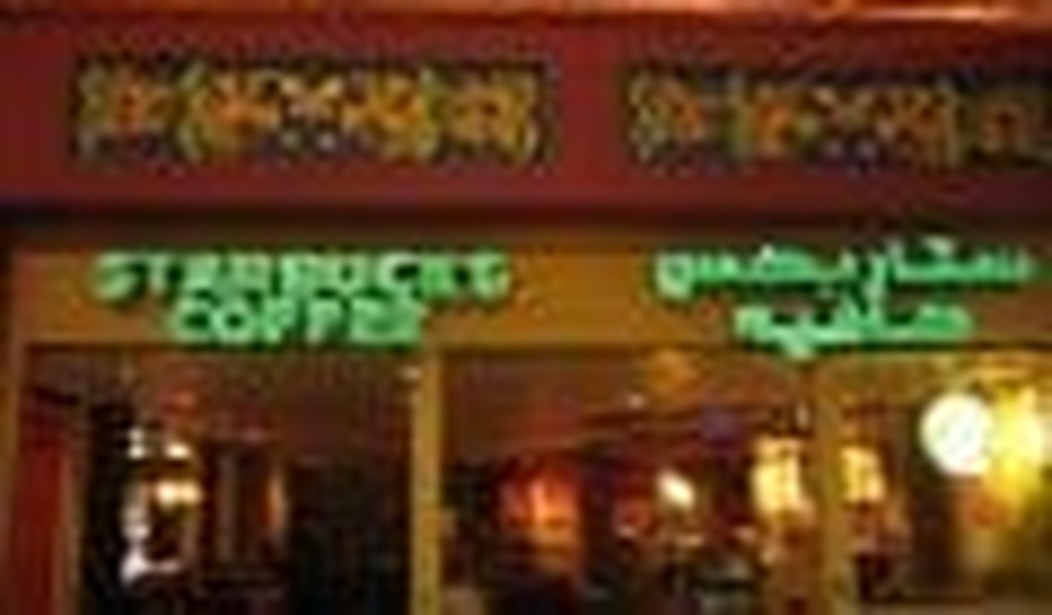The lavish shopping malls of Saudi Arabia feature Starbucks as a patent on modernity.
It was there in Riyadh a few days ago, while 37-year-old Yara sipped her latte, that the bearded religious enforcers of the Commission for the Promotion of Virtue and Prevention of Vice, the feared Muttawa, pounced upon her. They charged the mother of three with committing an immoral crime in a public place, dragged her out to one of their GMC trucks positioned around malls and restaurants, and hauled her to jail.
A co-owner of a finance company with multiple branches, the wealthy entrepreneurial Saudi businesswoman’s crime was conversing with one of her male employees about a new branch due to open soon. They were not married nor were they blood relatives. In Saudi law this is a “khulwa,” a pseudo-sexual disposition to commit sin.
In short order, as widely reported on February 5 and during subsequent days by Arab News, this member of a Jeddah merchant family along with her Syrian male subordinate were indicted on charges of illegal intimacy, strip searched, and locked up. Held incommunicado, her cell phone was confiscated before her husband eventually rescued her.
Saudi Starbucks plays to different tunes — as do McDonalds, KFCs, Cartier, and Bulgari shops — in the Kingdom. Only men are allowed to sip their coffees in public while married couples and siblings of mixed sexes retreat to a “family section” hidden behind walls, armed with documents showing they are blood relatives or spouses.
During prayer times, among other duties, the Muttawa jail shop owners who fail to shut their stores, suspend passport control at busy airports, and order assembly lines to come to a halt in factories.
On a reporting trip a few years ago I was caught during a noon prayer call at a chicken factory outside Riyadh. Suspended in midair was a row of birds hanging head down from a conveyor belt. The scene was Orwellian as Catholic Filipino workers listened to Koranic verses on loudspeakers waiting for the belt to move again so they could chop off the birds’ heads. Beyond our factory, across a sprawling city of six million, shopkeepers pulled shutters down; traffic stood immobilized at busy intersections and in the airports the lines became unbearably long.
We often speak of “moderate” Muslim regimes, juxtaposed with rabid Islamists such as Hamas, Iran’s mullahs, and Hezbollah’s madmen. In this lexicon Saudi Arabia qualifies as supremely moderate, with one White House after another, from Nixon to Bush, protecting it even after Osama bin Laden visited the U.S. on 9/11 with his Saudi hijackers. It might have a lot to do with Saudi oil and just as importantly millions of dollars of Saudi donations to presidential libraries (ten million US dollars to Bill Clinton alone, several more to Bush senior).
The idea is that Osama is a radical, but the royals, their judges, and their Muttawa are moderates.
Still, at Starbucks the other day the bearded ones took Yara to Malaz prison, where scores daily kneel to receive however many lashes a Sheikh decrees.
The Saudi lobbying machine tags the reigning monarch King Abdullah as a reformer extraordinaire. Indeed, a few weeks ago he was lavishly praised for ordering a brand new “social police” with the intention of softening the implementation of Koranic laws. Never mind that the laws themselves are left intact, alongside the 20,000 existing religious judges implementing them.
This, it is often explained by U.S. politicians, is progress. Such logic is in blatant disregard of the majority in a young Saudi population who see themselves as victims of a ruling family allied with an even more repressive theological establishment to suffocate women’s rights, human rights — and simple decency.
Saudi reformists say the entire edifice of 7th-century draconian sharia laws, along with the religious enablers in the government and the mosques, must go. The same King Abdullah announced some time ago another elusive promise to alter the entire judicial system, putting civilian judges in place of Muslim theologians, none of whom have ever seen a law degree.
True friends of Saudi Arabia know that reform is massive and has yet to begin. It includes doing away with madrassas, the rote teachings of jihad, subversive Islamist charities spreading Islamofascism, and multi-million-dollar donations to elite Western universities to spread a Saudi version of scholarship.
In the computer data business there is a famous saying: “garbage in equals garbage out.”
Real reforms start with school curricula, mosque sermons, the royal family itself, and the heart of the business establishment — as well as the Starbucks lounge.
Youssef M. Ibrahim, a former Middle East correspondent for the New York Times and Energy Editor of the Wall Street Journal is a freelance writer and Mideast political risk consultant based in New York.









Join the conversation as a VIP Member